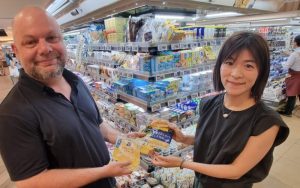
What’s the history of Miraka?
Twelve years ago, Māori trusts Tuaropaki and Wairarapa Moana formed this organisation, wanting to do things in a much more sustainable way.
Fonterra was the only option in town, but the founders didn’t feel the values they held dear were coming to the fore. They wanted to create their own destiny.
Tuaropaki held geothermal resources and Wairarapa Moana, through their Treaty settlement, owned lands in this part of the world.
While we’re not a cooperative, we’re a private company, but we operate as a whānau. It’s really important to us to bring in all the tikanga Māori principles, in all their shapes and forms. They’re walked and talked every day.
The founders were 20 years ahead of their time. The world is now catching up.

How does the geothermal dairy plant work?
Milk is sprayed into a big chamber in tiny little droplets, and a blast of heat comes up, meeting the milk halfway. It takes all the moisture out, and the powder falls to the bottom. That takes huge energy, to heat the volume of air that is blown up through that chamber. It is one of the most energy-intensive processes in the food sector.
These boilers were almost always coal-fired, using coal that was going to burn the hottest.
The geothermal option takes steam out of the ground, heated by magma below, and strips the water out – so you’ve got hot air only, and that goes straight through the chamber.
Our plant has a 94% smaller carbon footprint than a gas- or coal-fired dryer. We’re very fortunate to have been blessed in this part of New Zealand with the geothermal resources we’ve got, as well as some of the best fertile lands.
What do customers think?
Around the world, customers are lining up for stories of sustainable practices. That’s where the premiums are coming from today. The biggest food brands in the world are falling over themselves for anything that reduces their carbon footprint.
What does sustainability mean to Miraka?
In the broadest sense possible, sustainability is about needing to be a kaitiaki of our environment but also in the role we play in society and the community, and the way we operate with our customers. Commercial sustainability is also important.
The Mokai diary plant is located next to some of the largest greenhouses in New Zealand, operated by Tuaropaki. Those are heated by geothermal steam, the by-product of our generators. The steam carries carbon dioxide. Ironically, greenhouses and market gardens have to feed carbon dioxide in.
The by-products of the produce – the green stems and things that aren’t used – then go across the road to the worm farm, mixed with our daf [a dairy farm by-product], and it creates this ecosystem. This is used as the basis for the native nursery. Many Māori trusts are wanting to convert back into natives over time.
It’s about how you create this circular economy. It’s talked about a lot in the world but this is it – it’s way ahead of its time.

The dairy industry-government partnership is aiming to tackle agricultural methane and nitrous oxide. How is this affecting Miraka?
Through our payment plan, we incentivise our farmers based on their responsibility around kaitiakitanga, to make sure their herd is well maintained.
We offer our suppliers a farm gate price that is at least as good as the best option in town – plus an extra 15 cents per kilogram above that if you meet our criteria this season.
Farmers need on-farm management and nutrient plans. We don’t allow indiscriminate use of fertilisers on our lands.
We want to make sure the quality of milk meets the global standard. By having a focus on quality rather than volume, you encourage the farmer to take better steps towards herd health. It doesn’t lead to great intensification.
Farmers that want to replant some of their farm can get people from Miraka to come and help with that.
We don’t want to use our environmental standards as a stick to drive behaviour. We have our in-house experts that we put on to farms to help them with their own kaitiakitanga principles.
Correction: A caption in this article referred to Aaron Karaha as a member of the Miraka team. Karaha is the dairy manager for Tuaropaki Trust (article edited 1.30pm, June 15).






















